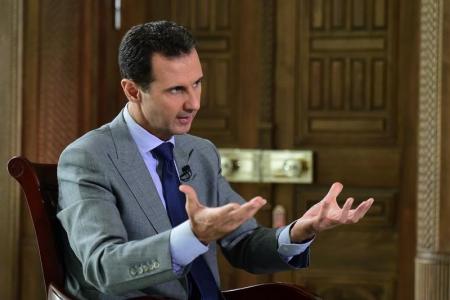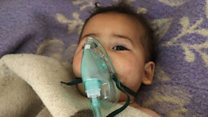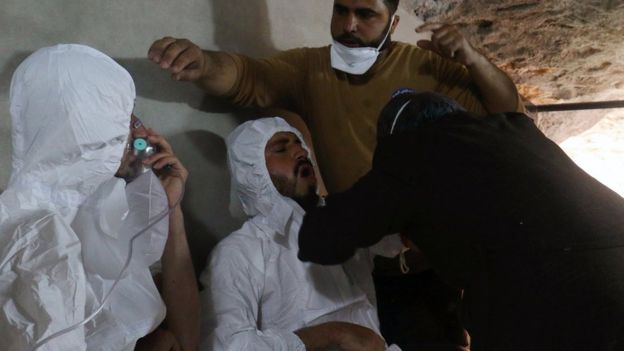
Syria’s President Bashar-al Assad says reports of a chemical attack by his forces were “100% fabrication”.
In an exclusive video interview with AFP news agency, he said “there was no order to make any attack”.
More than 80 people were killed in the rebel-held town of Khan Sheikhoun on 4 April, and hundreds suffered symptoms consistent with a nerve agent.
Witnesses said they saw warplanes attack the town but Russia says a rebel depot of chemical munitions was hit.
Shocking footage showed victims – many of them children – convulsing and foaming at the mouth. Sufferers were taken to hospitals across the border in Turkey.
Syria ‘chemical attack’: What we know
Mr Assad told AFP that the Syrian government had given up its chemical arsenal in 2013, adding “even if we have them, we wouldn’t use them”.
Since 2013, there have been continued allegations that chemicals such as chlorine and ammonia have been used against civilians, by both the Syrian government and rebel groups.
Turkey and the UK say tests show Sarin or a Sarin-like substance was used in Khan Sheikhoun, which would be the first time since 2013 that a prohibited chemical had been used on such a scale.

Mr Assad accused the West of making up events in Khan Sheikhoun so it had an excuse to carry out missile strikes on the government’s Shayrat airbase, which took place a few days after the alleged attack.
“It’s stage one, the play [they staged] that we saw on social network and TVs, then propaganda and then stage two, the military attack,” he said, questioning the authenticity of the video footage.
He also said Khan Sheikhoun, in Syria’s north-western Idlib province, had no strategic value and was not currently a battle front. “This story is not convincing by any means,” he told AFP.
Case against Assad’s version: By Jonathan Marcus, BBC defence and diplomatic correspondent
President Assad’s flat denial that his country has used chemical weapons and that last week’s incident was a fabrication concocted by al-Qaeda and Washington does not square with the “case for the prosecution”.
Indeed it sits uneasily with the Russian version of events which says that a rebel warehouse was hit by a bomb from a Syrian warplane thus releasing the chemical agent.
President Assad’s denials must contend with the fact that samples from some of the victims were analysed in Turkey and the results indicated a Sarin-like agent was used.
Then there is the detailed narrative, provided by the Americans who tracked the aircraft they say launched the attack, from its base, to the target location, and then home again.
There are too the many videos that were released immediately after the attack showing the victims. Their timing and location have been verified by independent researchers.
Western allies have said there is compelling evidence that the Syrian government was behind what happened in Khan Sheikhoun.
UK Prime Minister Theresa May said on Thursday it was “highly likely” the Assad regime was behind the attack. “Apart from anything else, we believe it’s the only regime that has the capability to make such an attack,” she added.
Turkey, which treated many of the wounded, says it has “concrete evidence”Sarin was used.
The US, UK and France reacted angrily on Wednesday after Russia, Syria’s key ally, vetoed a draft resolution at the UN Security Council – the eighth time it has done so over the Syrian conflict.
Mr Assad told AFP that he would only allow an “impartial” investigation, involving “unbiased countries… to make sure that they won’t use it for politicised purposes.

The US strikes and a reversal of what had been a growing diplomatic acceptance that Mr Assad’s removal was no longer a priority may have taken its toll, our correspondent adds.
The US had, until its Shayrat attack, limited its involvement in Syria to removing the so-called Islamic State (IS) from its stronghold in the city of Raqqa.
The Pentagon admitted on Thursday that it accidentally killed 18 members of the Syrian Democratic Forces, its ally in the fight against IS, in an airstrike on Monday, just south of the town of Tabqa, some 40km (25 miles) from Raqqa.
More than 300,000 people have lost their lives and millions of people have been displaced since a peaceful uprising against Mr Assad six years ago turned into a full-scale civil war.
Source – BBC
